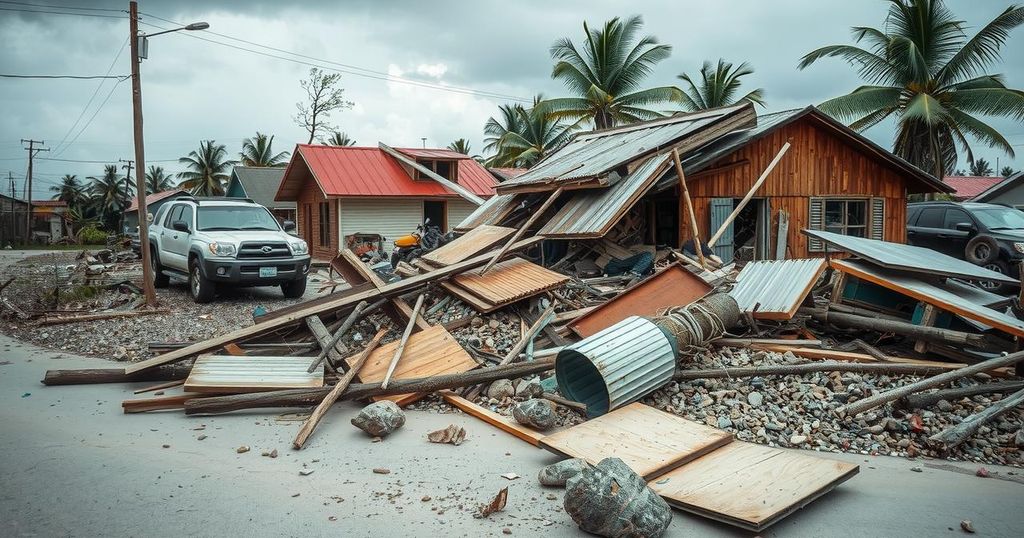World news
AFRICA, ATLANTIC OCEAN, CABO DELGADO, CHI, CHIURE, EMERGENCY RELIEF, EMERGENCY RESPONSE, INDIAN OCEAN, ISA, ISADORA ZONI, ISLAMIC STATE, MECUFI, MOZAMBIQUE, NATIONAL INSTITUTE FOR NATURAL DISASTERS, NATURAL DISASTER, NATURAL DISASTERS, UNITED NATIONS, UNITED NATIONS ’ REFUGEE AGENCY, UNITED NATIONS OFFICE FOR THE COORDINATION OF HUMANITARIAN AFFAIRS, ZONI
Jamal Abdullah
0 Comments
Death Toll from Cyclone Chido Climbs to 75 in Mozambique Amid Ongoing Crisis
Cyclone Chido has caused unprecedented destruction in Mozambique, with the death toll reaching 75, nearly double previous reports. The cyclone impacted Cabo Delgado province already affected by insurgency, resulting in widespread devastation and injury. Thousands remain displaced, compounding the crisis amid ongoing humanitarian challenges attributed to climate change.
The death toll from Cyclone Chido’s ravaging effects in Mozambique has increased to 75, according to government reports released on Friday. This figure is nearly double the earlier count, as rescue operations have accessed previously isolated areas impacted by the cyclone. The disaster struck Cabo Delgado province, a region already suffering from years of insurgent conflict, resulting in extensive destruction, notably in the district of Mecufi, where most buildings have been leveled.
The cyclone’s impact was devastating, with reports indicating at least 69 fatalities and over 740 injuries in the afflicted province. As rescue teams navigated treacherous, washed-out roads, they uncovered widespread devastation. “What you see is utter destruction,” stated Isadora Zoni, a United Nations refugee agency reporting officer, after assessing the damage in the affected areas.
Mozambique, recognized as one of the most impoverished nations worldwide, is grappling with the severe repercussions of climate change, which exposes it to frequent storms in the southern Indian Ocean. Cyclone Chido, characterized by winds reaching 115 miles per hour, comparable to a Category 3 hurricane, further exacerbated an already dire situation. In addition to the destruction of homes, vital health facilities, such as maternity clinics, were severely compromised.
The effects of the cyclone compounded the hardships faced by individuals who had already been displaced due to ongoing insurgent violence, with approximately 10,000 people living in tents in Chiure district alone. The United Nations refugee agency forewarned that Cyclone Chido could signify the onset of a harsh and destructive rainy season, historically associated with significant cyclones and flooding in the region.
Following Cyclone Chido’s onslaught, reports indicated that the cyclone also affected Mayotte, a French archipelago, where at least 31 deaths have been confirmed. The situation in Mozambique is grave, with climate-induced displacement affecting nearly 140,000 individuals in recent years due to extreme weather events, highlighting an urgent need for humanitarian assistance and intervention.
Cyclone Chido struck Mozambique’s northern province of Cabo Delgado, a region already vulnerable due to a protracted insurgency supported by the Islamic State. The aftermath of the cyclone exacerbated existing humanitarian challenges, displacing individuals multiple times as they transitioned between conflict and climate-induced crises. Mozambique’s geographical location makes it susceptible to severe storm systems originating in the southern Indian Ocean, which have increasingly impacted its socio-economic stability and health care infrastructure.
In conclusion, the devastation wrought by Cyclone Chido in Mozambique underscores the pressing intersections of climate change and conflict. With the death toll rising and communities grappling with the aftermath of both natural disasters and insurgent violence, there is an urgent need for international attention and support. Moving forward, it is crucial to address both the immediate humanitarian needs and the long-term implications of climate change on vulnerable regions such as Cabo Delgado.
Original Source: www.nytimes.com




Post Comment